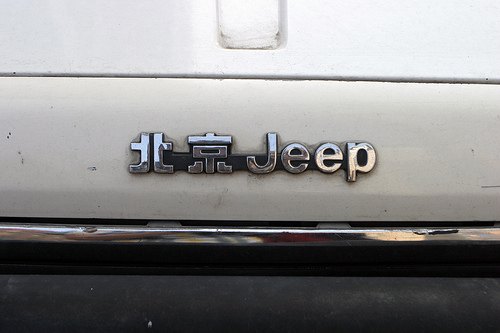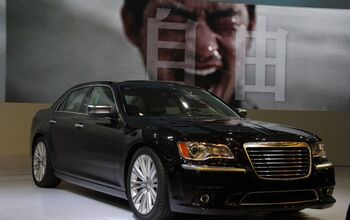Chrysler Sold To Beijing?

Chrysler was actually the first joint venture in China, (dis)gracing the Chinese landscape with countless Cherokees. And this is where Chrysler might end up. Beijing Auto, a state-owned automaker that makes Hyundai, Mercedes and a few local brands, has “set up a work team in charge of the acquisitions and restructuring affairs, which will mainly involve its merger of a smaller Chinese carmaker Fujian Motor and purchase of US auto giant Chrysler’s assets,” Gasgoo reports. The reports are quite detailed, this time:
Beijing Automotive Industry Holding Corp (BAIC, or Beijing Auto) is expected to get Beijing city’s financial support of 10 billion yuan ($1.47 billion) for acquisitions and restructuring and for own brand creation. The Beijing municipality will extend to Beijing Auto funding of up to 10 billion yuan. Five billion yuan will be used to buy Fujian Motor, a company that already makes some Chrysler models in China, including the Grand Voyager minivan. The remaining five billion yuan will be used to buy Chrysler’s seven models, an R&D center, engine model, assembly line, and to create its own brands.
Chrysler LLC quit a joint venture between Beijing Auto and Daimler AG in late 2008, a year after Daimler sold its control of the US automaker, but Chrysler’s 300C sedan is still made at the Beijing venture. Sources said Beijing Auto’s work team has departed to the US for asset-acquiring talks with Chrysler. Rumors of an asset sale by Chrysler to BAIC had been floated before, but quickly denied.

Bertel Schmitt comes back to journalism after taking a 35 year break in advertising and marketing. He ran and owned advertising agencies in Duesseldorf, Germany, and New York City. Volkswagen A.G. was Bertel's most important corporate account. Schmitt's advertising and marketing career touched many corners of the industry with a special focus on automotive products and services. Since 2004, he lives in Japan and China with his wife <a href="http://www.tomokoandbertel.com"> Tomoko </a>. Bertel Schmitt is a founding board member of the <a href="http://www.offshoresuperseries.com"> Offshore Super Series </a>, an American offshore powerboat racing organization. He is co-owner of the racing team Typhoon.
More by Bertel Schmitt


































Comments
Join the conversation
This is directed more to the comments from menno and dilbert but... The problem as I see it isn't that a "quality table" costs $7500 or that it is smarter to buy Ikea and not worry about damages. The problem is that we are losing the ability to create quality items in our quest to make do with something cheap. If everyone buys Ikea kitchens (I did), who will be the next to learn to be a skilled cabinate maker? To make that custom kitchen out of fine woods and carved moldings? If you can find someone, the cost will be to high. My father is a skilled craftsman as was his father before him. They are/were famous in their little circles for the quality of work they did/do. My brother and I grew up in the throw away society and would rather just buy cheap, and replace as necessary rather than commit to hard work and creativity. Unlike my brother (who is very creative and inhereted my fathers talents), I grew up appreciating those skilled craftsmen; the last true woodright (wooded ship builder), the machinist who can make the car part for you (with out a CNC machine). We saw the erosion on craftmanship being replaced with technology and the integrated chip. Japan and China replaced America as a manufacturing powerhouse due to cheap labor and we bought into the idea that we could always replace it. But a common theme in my high school years was surviving in a post nuclear war world. That meant knowing how to rebuild a world that lost it's technology. This was a very real fear for young Americans. It fueled an amount of self sufficiency and a thirst for at least a taste of the (soon to be) lost knowledge. Another example can be found in architecture. I find it quite incredible to look at 16th through 19th century buildings with all their detail, and then compare it to the boxes made in the last two. Why are there no gargoyles and sculpted cornices? Because it is cheaper to not add them. The question is what is best for society as a whole? I don't have the answer, but I think it is a mix of both. However, with all this "green thinking" popular today, in the long run we will most likely have a bigger price to pay.
Celica and Dilbert what you are missing is that if the manufacturing jobs come back to the U.S. then that will mean millions of new jobs. When you have a major influx of jobs with a set number of workers the pay scale will go up so you will make more money and be able to buy the higher cost products. Also as Menno said the higher cost products promotes recycling and creates jobs repairing the products.
The lead paint joke is not funny anymore. Every single post on China, someone has to come up with it.
So, if Cerberus sells Chrysler to the Chinese, where does the money go? Will Cerberus, separate from Chrysler LLC, collect the money and pay out to investors while leaving Beijing Auto to work out a way to repay the bailout? I'm guessing they structure the deal such that a new LLC is formed with all of Chrysler's assets, the money from the sale goes to Cerberus, and Chrysler LLC is allowed to declare CH7 and die along with their debt to us.